
Strong signs that next European Parliament will be cycling-friendly
In the run-up to the next European Parliament elections on May 22-25, ECF and its members invited candidates to reply to a survey on European cycling policy. 364 Member of European Parliament (MEP) candidates filled in the survey – and demonstrated overwhelming support for ECF demands with an average acceptance rate of 90 %.
364 MEP candidates from 23 countries across all main political groups filled in the ECF survey, with most replies in absolute numbers coming from Finland (40) and Spain (31) followed closely by Slovakia and Greece (30 each). Relative to the size of the population and number of MEP seats, most replies came from Luxembourg (11).
See the break down per country
|
Country |
Number of answers |
|
Belgium |
15 |
|
Bulgaria |
3 |
|
Cyprus |
13 |
|
Czech Republic |
19 |
|
Denmark |
15 |
|
Estonia |
11 |
|
Finland |
40 |
|
France |
19 |
|
Germany |
27 |
|
Greece |
30 |
|
Ireland |
4 |
|
Italy |
24 |
|
Latvia |
12 |
|
Lithuania |
21 |
|
Luxembourg |
11 |
|
Malta |
3 |
|
Netherlands |
10 |
|
Poland |
11 |
|
Portugal |
14 |
|
Slovakia |
30 |
|
Spain |
31 |
|
United Kingdom |
1 |
|
Grand Total |
364 |
The highest acceptance rate of any of the 10 ECF recommendations was on making motorized vehicles safer for pedestrians and cyclists (96 %). Also ECF’s demand that the European Commission develops and adopts a European Master Plan on Cycling by 2019 was approved by 93 % of the respondents. The lowest support rate appeared to be on ECF’s demand regarding mandatory collection of data and statistics on cycle use at European and national level (73 %). Several respondents said in the comment box that the subsidiarity principle was a reason for not supporting some of ECF’s positions, while ensuring to be in favour of cycling in general. The exact results for each of the 10 questions can be found below.
ECF also asked the MEP candidates on how often they cycle. The same question and possible answers were part of the Special Eurobarometer 406 “Attitudes of Europeans towards urban mobility” from 2013. While the replies on “At least once a day” and “A few times a week” score only slightly higher for MEP candidates who filled in the ECF survey compared to the whole EU-28 population, only 1 in 8.5 MEP candidates said that they “never” cycle, compared to half the European population.
|
How often do you cycle? |
MEP candidates who filled in ECF survey |
EU-28 |
|
At least once a day |
15% |
12% |
|
A few times a week |
30% |
29% |
|
A few times a month or less |
40% |
20% |
|
Never |
12% |
50% |
|
Don't know |
3 % |
1% |
If you want to use it to make your own analyse or infographics, you are very welcome. Please email them to us (f.kuester@ecf.com).
Quotes from candidates
ECF’s aim of this European Parliament election survey was to build and strengthen its relationship with incoming MEPs for the next parliamentary term at an early stage and to set the policy agenda for the coming 5 years. Luxembourgish conservative MEP Georges Bach (European People’s Party - EPP) comments in the ECF survey: “My respect to ECF and its national member organisations. Being an MEP since 2009 I have always worked within the Transport Committee of the European Parliament for the interest of cyclists and I will continue to do so in case I will get re-elected.”
German social-democrat MEP Ismail Ertug (Socialists & Democrats - S&D) states: "Cycling and its benefits for health and the environment must be better promoted across the European Union. A coordination of cycling policy in the form of a European Master Plan on Cycling is needed to find ways to make cycling become an attractive alternative to motorised vehicles, where applicable. The EU must also help Member States to finalise the EuroVelo routes by 2020, as it constitutes a major European tourism project with great economic potential for all regions."
Dutch liberal MEP Sophia in 't Veld (Alliance of Liberals and Democrats for Europe - ALDE) shares the positive views on the environmental and health benefits of cycling and claimed in the survey: “Many people in Europe consider the Netherlands as guiding example on cycling policy. They’d like to see in their countries the same levels of cycling. D66 wants to promote sustainable transport in Europe: It’s better to move around by bicycle than by motorized transport. That’s why we support the carriage of bicycles in international trains.”
German MEP Michael Cramer from the Greens-European Free Alliance says: "A better Europe is a more environmental friendly Europe. To promote cycling will be an important measure to protect us from climate change, reduce levels of noise and improve the quality of air in our towns and cities. Let's therefore make Europe more bicycle-friendly."
Latvian Roberts Zile, member of the European Conservatives and Reformists political group, supports the view of investing European financial resources into cycling facilities and explains: “EU financial resources in the field of transport funding (mainly CEF [Connecting Europe Facility,] but also Horizon 2020 [The world’s largest research program,]) should be allocated to the development of cycling. I together with some of my colleagues in the European Parliament's Transport and Tourism (TRAN) Committee in Parliament work on it this term.”
Finnish Annika Lapintie (European United Left/Nordic Green Left - GUE/NGL) sees high potential in cycling being better integrated with public transport systems adding: “The generalization of shared bike systems among the biggest cities should be promoted. These improvements would serve both co mmuters and holiday travellers.”
While ECF welcomes these positive responses from MEP candidates, we want to build a sustainable relationship with incoming MEPs after the elections. Therefore ECF will initiate the launch of a “Cycling Mobility Forum” in autumn. Chaired by MEPs, it should become a Brussels-based platform where ECF can meet and discuss cycling-related policy issues with all relevant stakeholders to advance our mission, says ECF Secretary General Dr Bernhard Ensink: “More people cycling more often.”
Break down per question:
EU funds for cycle projects
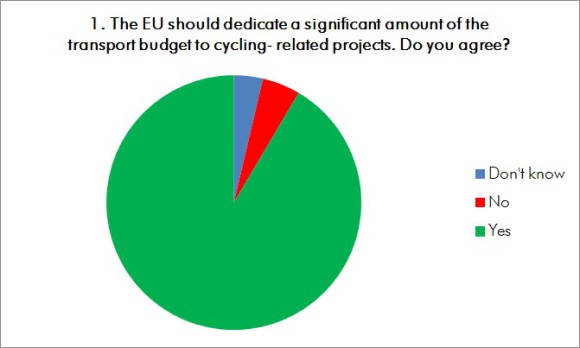 Better provisions for cycling will encourage more people to cycle more often. ECF therefore believes that 10% of all transport budgets should be earmarked for cycling. In the EU, this would translate into €6bn of investments for cycle projects for the period 2014 - 2019. During the previous EU Financial period (2007 – 2013), approximately €600 million (i.e. 0.7 % of EU co-funding) was earmarked for cycling infrastructure from its €82 billion fund for transport infrastructure.
Better provisions for cycling will encourage more people to cycle more often. ECF therefore believes that 10% of all transport budgets should be earmarked for cycling. In the EU, this would translate into €6bn of investments for cycle projects for the period 2014 - 2019. During the previous EU Financial period (2007 – 2013), approximately €600 million (i.e. 0.7 % of EU co-funding) was earmarked for cycling infrastructure from its €82 billion fund for transport infrastructure.
Support EuroVelo, the European cycle route network
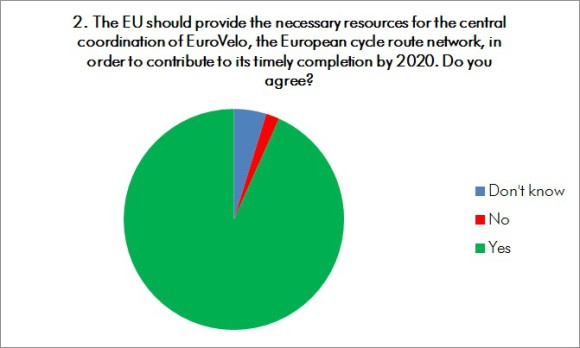 EuroVelo, the European cycle route network, is a network of 14 long-distance cycle routes that connect the entire continent. EuroVelo is coordinated on the European level by ECF with a network of National EuroVelo Coordination Centres organising the realisation of the routes at a national level. These organisations are working together to complete the network by 2020. Europe’s contribution to that should be the earmarking of TEN-T funds for building EuroVelo infrastructure and by providing financial and technical assistance for the coordination and promotion of the network on the European level.
EuroVelo, the European cycle route network, is a network of 14 long-distance cycle routes that connect the entire continent. EuroVelo is coordinated on the European level by ECF with a network of National EuroVelo Coordination Centres organising the realisation of the routes at a national level. These organisations are working together to complete the network by 2020. Europe’s contribution to that should be the earmarking of TEN-T funds for building EuroVelo infrastructure and by providing financial and technical assistance for the coordination and promotion of the network on the European level.
Safer motorised vehicles for pedestrians and cyclists
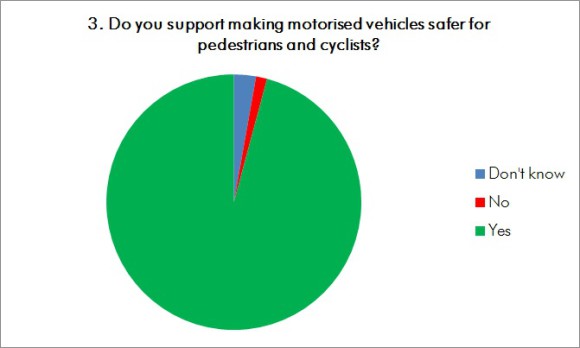 About half of all fatal accidents in urban areas involve pedestrians and cyclists. As speeding and collisions with motor vehicles are the main killers, action should be urgently taken to improve safety. In order to address speeding, more and more towns and cities have introduced 30 km/h speed limits throughout large parts of their road network. However, this contradicts the Vienna Convention on Road Traffic from 1968 where the default road speed in European built-up urban areas is limited to 50 km/h. ECF thinks it is time that this default speed was lowered to 30 km/h. Lower speed limits also have to be enforced. Intelligent Speed Assistance has proven to be an effective and very cost-efficient tool in doing that. In addition, lorries have to be made safer. Due to the brick shape of the lorry cabin and the high position of the driver, large blind spots occur around the cabin, causing many serious cycling injuries and fatalities .A change in European law should require lorry makers to develop better cabin designs.
About half of all fatal accidents in urban areas involve pedestrians and cyclists. As speeding and collisions with motor vehicles are the main killers, action should be urgently taken to improve safety. In order to address speeding, more and more towns and cities have introduced 30 km/h speed limits throughout large parts of their road network. However, this contradicts the Vienna Convention on Road Traffic from 1968 where the default road speed in European built-up urban areas is limited to 50 km/h. ECF thinks it is time that this default speed was lowered to 30 km/h. Lower speed limits also have to be enforced. Intelligent Speed Assistance has proven to be an effective and very cost-efficient tool in doing that. In addition, lorries have to be made safer. Due to the brick shape of the lorry cabin and the high position of the driver, large blind spots occur around the cabin, causing many serious cycling injuries and fatalities .A change in European law should require lorry makers to develop better cabin designs.
A level playing-field for cycling with other transport modes
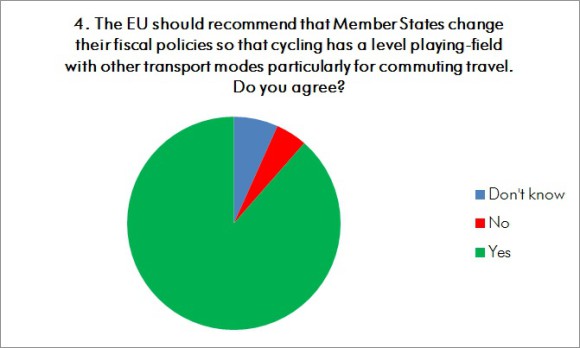 Congestion is one of the main challenges for Europe’s transport system, in particular during peak hours. Many national fiscal regimes give unsustainable transport incentives such as making the provision and use of company cars to employees very attractive. As a result, company cars account for roughly 50 % of all new car sales in the EU. Member States should be encouraged by the EU to introduce fiscal measures to incentivise cycling or remove barriers for cycling for home-work travel. ECF also wants Member States to have the possibility to apply a reduced VAT rate on bicycle sales.
Congestion is one of the main challenges for Europe’s transport system, in particular during peak hours. Many national fiscal regimes give unsustainable transport incentives such as making the provision and use of company cars to employees very attractive. As a result, company cars account for roughly 50 % of all new car sales in the EU. Member States should be encouraged by the EU to introduce fiscal measures to incentivise cycling or remove barriers for cycling for home-work travel. ECF also wants Member States to have the possibility to apply a reduced VAT rate on bicycle sales.
Better air quality in Europe
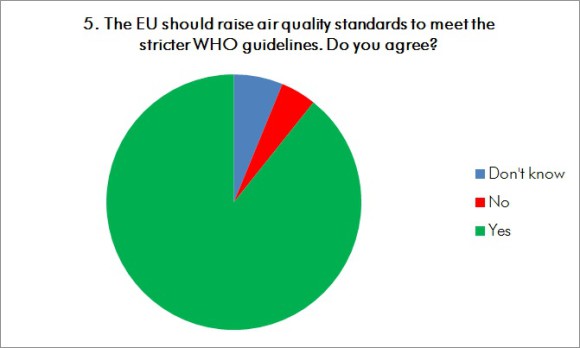 Air pollution caused over 400,000 premature deaths in 2010. 90 % of inhabitants are exposed to one of the most damaging air pollutants at levels deemed harmful to health by the WHO. ECF wants the EU to strengthen its ambient air limits by aligning the Ambient Air Quality directive (AAQD) with the WHO guidelines. In order to improve air quality, cycling must be prioritised over individual motorised transportation. Motor vehicles driving in urban settings – powered two- and three wheelers, cars, vans, trucks – also have to become cleaner.
Air pollution caused over 400,000 premature deaths in 2010. 90 % of inhabitants are exposed to one of the most damaging air pollutants at levels deemed harmful to health by the WHO. ECF wants the EU to strengthen its ambient air limits by aligning the Ambient Air Quality directive (AAQD) with the WHO guidelines. In order to improve air quality, cycling must be prioritised over individual motorised transportation. Motor vehicles driving in urban settings – powered two- and three wheelers, cars, vans, trucks – also have to become cleaner.
The benefits of cycling in health policy and the health dimension in transport appraisal
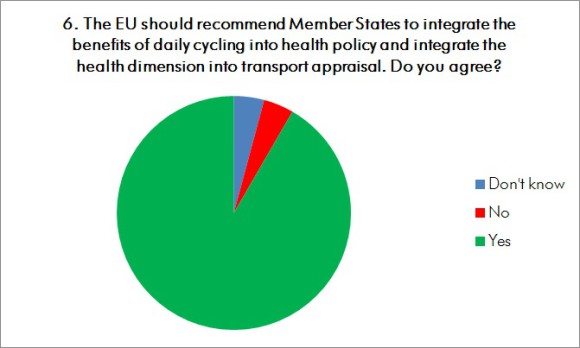 Transport and public health are intricately linked. Lack of physical activity is the greatest risk for major lifestyle diseases and the most important cost driver for European health care systems. Active mobility can reduce these costs considerably as prevention is much cheaper than treatment. Similarly, cost-benefit analysis in transport appraisal has shown that investing in cycling delivers higher benefit-cost ratios than investing in individual motorised transport, mainly due to the health benefits of cycling. As a consequence, the EU should recommend that Member States include the benefits of cycling in health policy and to integrate the health dimension in transport appraisal. If transport infrastructure is built with EU money, the health dimension must be integrated.
Transport and public health are intricately linked. Lack of physical activity is the greatest risk for major lifestyle diseases and the most important cost driver for European health care systems. Active mobility can reduce these costs considerably as prevention is much cheaper than treatment. Similarly, cost-benefit analysis in transport appraisal has shown that investing in cycling delivers higher benefit-cost ratios than investing in individual motorised transport, mainly due to the health benefits of cycling. As a consequence, the EU should recommend that Member States include the benefits of cycling in health policy and to integrate the health dimension in transport appraisal. If transport infrastructure is built with EU money, the health dimension must be integrated.
Cycling fully integrated in the multi-modal transport system
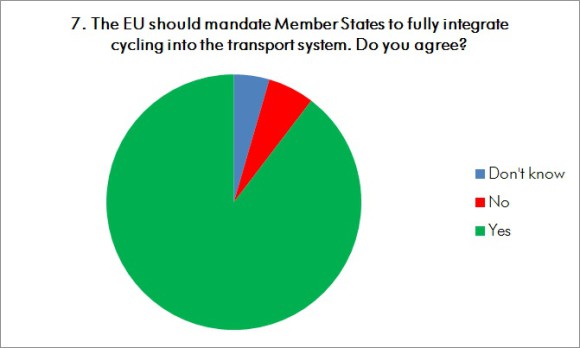 Access to mobility rather than owning a private car will become the default solution in the 21st century sharing economy. Cycling must be a full partner in this. If the EU is to fund the development of multi-modal journey planners, information about bicycle networks, access to bike-sharing schemes and bike parking has to be integrated. Likewise, bike-sharing schemes should be a full part of integrated ticketing schemes. On long-distance train journeys, the carriage of complete bicycles should be allowed on all services, amending Regulation EC 1371/2007 on passenger rights’ and obligations accordingly.
Access to mobility rather than owning a private car will become the default solution in the 21st century sharing economy. Cycling must be a full partner in this. If the EU is to fund the development of multi-modal journey planners, information about bicycle networks, access to bike-sharing schemes and bike parking has to be integrated. Likewise, bike-sharing schemes should be a full part of integrated ticketing schemes. On long-distance train journeys, the carriage of complete bicycles should be allowed on all services, amending Regulation EC 1371/2007 on passenger rights’ and obligations accordingly.
Statistics and data collection on cycle use
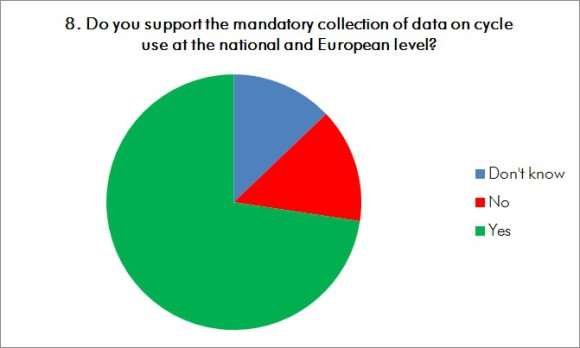 Data is politics. Most importantly, they are being used to justify decisions on what investments in transport infrastructure are to be made. While some Member States collect very good data on cycle use at the national level, others do not. As a consequence, Eurostat does not publish any data on cycle use either. In order to get good data on actual cycling behaviour, ECF recommends the Commission to convene expert groups and expert evaluation to come up with a package of measures for cycle use. Based on the recommendations, the EU and Member States should be required to collect data on cycle use.
Data is politics. Most importantly, they are being used to justify decisions on what investments in transport infrastructure are to be made. While some Member States collect very good data on cycle use at the national level, others do not. As a consequence, Eurostat does not publish any data on cycle use either. In order to get good data on actual cycling behaviour, ECF recommends the Commission to convene expert groups and expert evaluation to come up with a package of measures for cycle use. Based on the recommendations, the EU and Member States should be required to collect data on cycle use.
A European Master Plan for the promotion of cycling
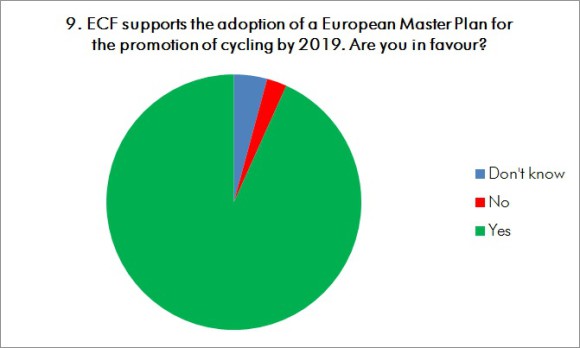 Cycling relates to a whole range of European policy fields. This calls for a horizontal integration to overcome the current piecemeal approach by the different Commission Directorate Generals. 11 EU Member States have a current national strategy on cycling in place, defining objectives, tools and likely outputs, but also giving a strong signal to all other authorities at local and regional policy that cycling matters. The European Commission should follow the national example and develop and publish a European Master Plan on the promotion of cycling at the latest by 2019.
Cycling relates to a whole range of European policy fields. This calls for a horizontal integration to overcome the current piecemeal approach by the different Commission Directorate Generals. 11 EU Member States have a current national strategy on cycling in place, defining objectives, tools and likely outputs, but also giving a strong signal to all other authorities at local and regional policy that cycling matters. The European Commission should follow the national example and develop and publish a European Master Plan on the promotion of cycling at the latest by 2019.
An EU transport modal split target for 2030
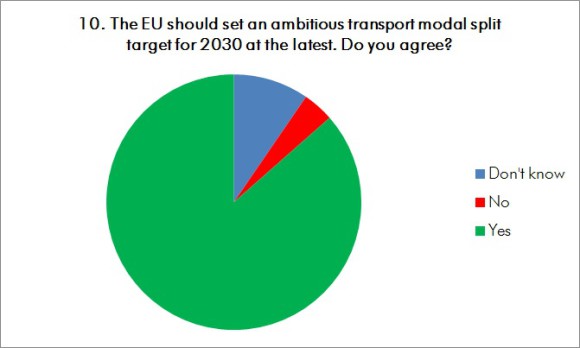 The EU has set itself very concrete targets on many policy issues, including on transport and urban mobility. For example, the Commission wants to phase out the use of ‘conventionally-fuelled’ cars in cities by 2050; and achieve essentially CO2-free city logistics in major urban centres by 2030. While ECF welcomes the urban mobility targets, we think it is crucial to add to it a transport modal split target as a meaningful supplement. If today’s ‘conventionally-fuelled’ cars in cities will be simply replaced by non-conventionally fuelled cars, e.g. e-cars, nothing will be gained in improving the quality of public space in urban areas, in solving the lack of inner-city parking facilities or in increasing physical activity of EU citizens. At least 6 EU Member States have set specific targets on cycle use.
The EU has set itself very concrete targets on many policy issues, including on transport and urban mobility. For example, the Commission wants to phase out the use of ‘conventionally-fuelled’ cars in cities by 2050; and achieve essentially CO2-free city logistics in major urban centres by 2030. While ECF welcomes the urban mobility targets, we think it is crucial to add to it a transport modal split target as a meaningful supplement. If today’s ‘conventionally-fuelled’ cars in cities will be simply replaced by non-conventionally fuelled cars, e.g. e-cars, nothing will be gained in improving the quality of public space in urban areas, in solving the lack of inner-city parking facilities or in increasing physical activity of EU citizens. At least 6 EU Member States have set specific targets on cycle use.
LINKS:
- Our Manifesto is availabe in short version in 8 languages and long version here: http://ecf.com/manifesto-for-the-european-parliament-elections-2014/
- The questions: 140303_EP 2014 elections_ECF manifesto_survey_FINAL
- The raw results:ECF survey raw results
About the Author
Fabian Küster is a Senior Policy Officer at the European Cyclists’ Federation. He has previously worked in Brussels for a German Member of European Parliament and the German Embassy. He has wealth of experience in and around the EU institutions, and is an expert in the EU policy field of bicycles
Contact the author
Recent news!
Upcoming events
Contact Us
Avenue des Arts, 7-8
Postal address: Rue de la Charité, 22
1210 Brussels, Belgium










